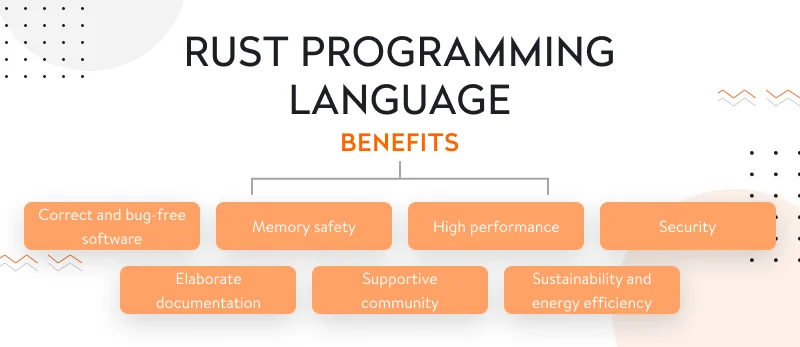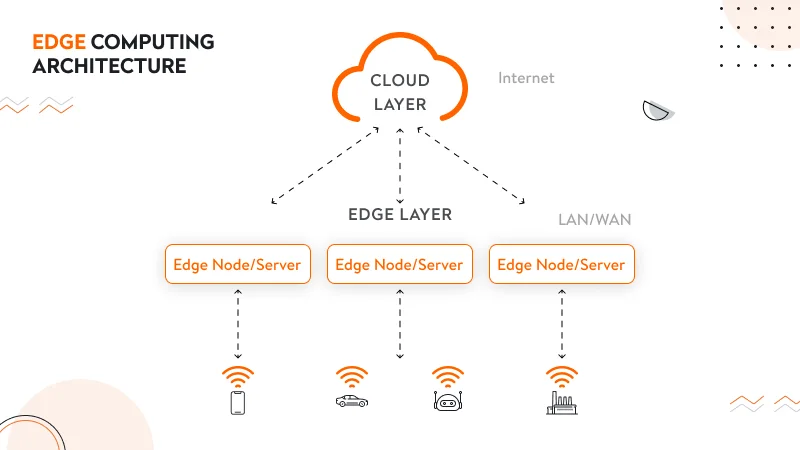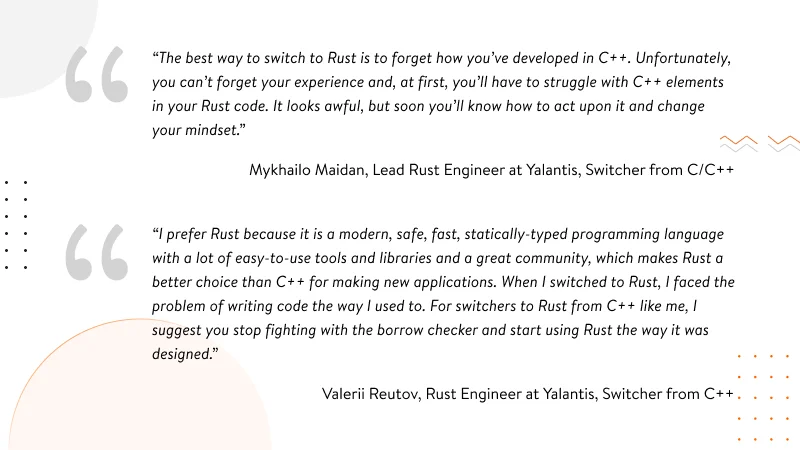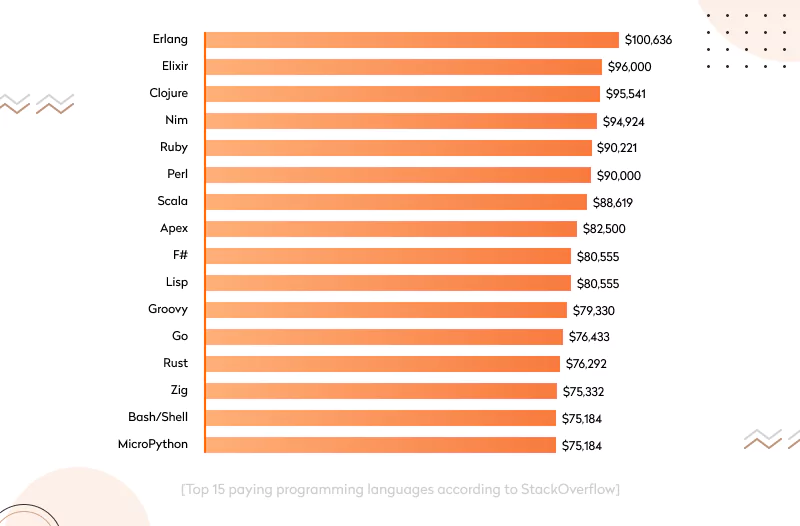
Rust market overview: reasons to adopt Rust, Rust use cases, and hiring opportunities
The Rust programming language has been steadily evolving since 2010, but it was publicly released only in 2015. The language was initially developed by Graydon Hoare in 2006 and has been supported by Mozilla Firefox since 2009. Immediately upon its release in 2015, the developer community accepted Rust and realized its potential and huge benefits compared to more widespread programming languages like C and C++.
In 2021, the Rust Foundation was established by Amazon, Google, Huawei, Microsoft, Mozilla, and other industry giants to support the language and its community. The Rust Foundation aims at assuring the tech world that Rust is here to stay for years to come, as it’s proven a reliable and extremely useful programming language.
In this post, we discuss why Rust is so popular among developers and how this language has managed to win so much trust from the tech community in just a few years. We also cover when Rust web development can be the most beneficial and what Rust is good for. Finally, we consider how you can find and hire Rust developers to gain the most advantage for your business.
Growing popularity of Rust development services in numbers
According to Stackoverflow’s Annual Developer Surveys, Rust has been among the most wanted and loved programming languages for a few years. In the table below, you can see how dramatically the number of software developers interested in Rust development has grown.

According to the same Stackoverflow’s survey, Rust continues to be the most-admired programming language with an 83% score this year. SlashData has identified Rust as the fastest-growing language community. In the latest available State of the Developer Nation 22nd Edition, Rust also moved from 14th to 12th place in SlashData’s ranking of programming languages in just six months. Around this programming language has gathered a strong community of developers who care about performance, memory and thread safety, and security.
The adoption of Rust by huge tech companies is also inspiring:
- Mozilla was the first company associated with Rust. Graydon Hoare, the inventor of Rust, worked at Mozilla Research, and the company soon invested in the language and became its loyal supporter. When writing Stylo, the CSS engine in Firefox, developers were able to replace about 160,000 lines of C++ code with only 85,000 lines of Rust code.
- Dropbox, a popular file hosting service, has written some of its core file storage components in Rust. The language is also used to develop some features of the brand’s file-syncing engine.
- Cloudflare, a content delivery network and provider of web security services, leverages Rust because the language offers WebAssembly support. They also used Rust to create Pingora, an in-house HTTP proxy that serves over one trillion requests a day.
- Discord, a social platform for instant messaging and voice communication, switched from Go to Rust to avoid the latency spikes they used to experience with the Read States service.
We can see that lots of large and prominent companies are reaping lots of benefits from using Rust. In the next section, we consider these benefits in detail.
Rust benefits and why developers choose it
According to a recent Rust survey conducted among 9450 Rust developers, here are the top reasons developers use Rust:
- The possibility to build correct and bug-free software (87.1%)
- High performance of the language (84.5%)
- Robust security properties (74.8%)
These are the three pillars of the Rust programming language that make it such a viable option. Let’s focus on these benefits and some more in detail to see how they can be advantageous for businesses.

Correct and bug-free software. With Rust, you can be sure that if the code compiles, it’s correct and will work as planned. Rust doesn’t have undefined behavior present in other programming languages that can be spotted only during production when it’s already late and costly to fix bugs. Thus, Rust applications are unlikely to fail in production, as their behavior is defined and predictable.
Memory safety. Rust software won’t have memory leaks, as it enforces an ownership model and the Resource Acquisition Is Initialization (RAII) concept. It also doesn’t require manual memory management. Plus, Rust doesn’t have a garbage collector (a tool for freeing application memory by gathering unused memory), which occupies much of the runtime in other programming languages like Java and C#.
Here is an example of why memory safety is such an important benefit of Rust application development. In C++ applications, there are often cases when manual freeing of memory isn’t considered in the code in advance, leading to memory leaks. The longer the system exists, the more memory it starts using. This memory use will grow until the system memory is completely exhausted. Eventually, the system gets stuck and reboots. System rebooting may happen at any time, causing inconveniences for the business and system users.
High performance. The virtual machines and garbage collectors used by some languages significantly impact application performance. A garbage collection process stops the work of the application until its job is done. Thanks to the ownership model and RAII concept in Rust, you can ensure your application’s uninterrupted and high performance.
Security. The security of Rust code is a natural consequence of its memory safety and correctness. Using Rust development services by an experienced vendor will help you avoid a wide range of memory-safety vulnerabilities that can expose your software to data corruption, crashes, and malicious attacks.
Sustainability and energy efficiency. Along with C, Rust is considered one of the most energy-efficient languages. However, thanks to its impressive memory safety and security benefits, Rust significantly outperforms C. The fact that Rust is also a super-fast compiled language without a garbage collector and a virtual machine contributes to its high energy efficiency. And that’s one of the reasons lots of prominent companies are seizing the opportunity to implement Rust. For instance, AWS is actively offering diverse solutions in Rust to foster next-generation sustainable software development.
Even though developing a software solution in Rust may require more effort and investments at the beginning, your final software product will be energy-efficient, cost-efficient, and secure, and it won’t require frequent and costly changes in the future.
Elaborate documentation and supportive community. The Rust community is one of the fastest-growing, and its documentation is properly organized and sufficiently detailed. Support and feedback from the Rust community are also strong, allowing developers to exchange experiences and ideas, driving the spread of this programming language around the world.
In the next section, we take a closer look at Rust language use cases in the business world to help you better understand what has made Rust one of the most loved languages for years and define its place in the modern technology ecosystem.
What is Rust used for and why might you need it?
Rust is a general-purpose language with functional programming capabilities for building efficient, scalable, maintainable, and productive software components. With Rust, it’s possible to build high-performance distributed systems, embedded systems, IoT solutions, and all sorts of web services.
Explore more information about Rust in our new article about Golang vs Rust.
One of the prominent Rust application examples is the Linux Kernel, which is primarily written in C. The Linux community decided to add Rust support in creating kernel modules. When Mozilla Firefox switched to Rust, doing so made it one of the fastest browsers in the world.
Systems programming: embedded and distributed systems
The Rust programming language is perfect for embedded systems. With Rust frameworks, you can develop bare-metal and real-time operating system (RTOS) embedded systems. In bare-metal systems, firmware written in Rust can run directly on a microcontroller’s hardware without an abstraction layer of the operating system and drivers. For RTOS embedded systems, there is a need for a real-time operating system, particularly for applications that should have a quick response time.
Tock is an example of an embedded operating system written in Rust. This operating system is suitable for sensor networks and IoT platforms. Tock allows multiple applications to run concurrently on a microcontroller-based computer. Another example of an embedded operating system written in Rust is Theseus OS. According to its documentation, Theseus can be especially useful in high-end embedded systems and edge data centers.
Another great Rust application is in large distributed networks with lots of connected devices that require aggregating and processing large amounts of data. Thus, IoT device manufacturers and medical device manufacturers can especially benefit from adopting Rust.
Read also: IIoT data management and analytics for large manufacturers
IoT connectivity and edge computing
Rust can take IoT technologies to a totally new level — the fastest level, actually. In 2019, 42 Technology announced its first single-chip IoT devices built on Rust. Writing firmware for the embedded device in Rust proved faster than writing firmware in C. Thus, 42 Technology revealed the massive potential of Rust for ensuring high-speed IoT connectivity in embedded systems.
This language is extremely versatile and suitable for all levels of IoT connectivity: cloud, edge, and IoT devices. Depending on your business needs, you can choose to integrate Rust on any of these levels to ensure high-speed data processing and quick system response times.
At the device level, Rust is great for writing firmware that enables efficient processing of data from sensors. For edge gateways and data centers, Rust allows you to get the most out of hardware to ensure maximum network performance. As a high-productivity programming language, Rust has an advantage over other programming languages in the cloud environment as well.

High-performance development toolsets
One of the popular uses for Rust is building development kits and toolsets that simplify and streamline software development. Rust is a good fit for building libraries to manage high loads, such as libraries for high-speed data and image processing. With the help of Rust-based libraries, it’s possible to build scalable and fast applications. For instance, a data science services company may leverage Rust to develop high-performance algorithms for data analysis, significantly improving data processing times and system efficiency. With the help of Rust-based libraries, it’s possible to build scalable and fast applications. For example, the promising biotechnology startup Imeka is using Rust to build a library for enabling high-performance and high-resolution medical imaging algorithms on their brain imaging platform.
Rust is also a great option for building debugging and testing tools, helping developers quickly define and fix software vulnerabilities. For example, the information security consulting company Stratum Security is using Rust in conducting data exfiltration testing to ensure better application security for their clients. JetBrains offers convenient testing and debugging tools in Rust.
Read also: Testing IoT solutions: Guide to implementing a performance testing framework
Low-latency web services
Many global businesses such as Braintree, Postmates, and Snapview make use of Rust app development services to build strong backend logic for their web services. Actually, Rust is suitable for streamlining any kind of client-server architecture. Snapview, a German digital communication company, uses Rust on the server side to provide high-quality and high-performance video conferencing services.
Building web services in Rust is the right way to go to ensure high performance and low latency for your web applications and platforms. However, software performance is always dependent on both the software architecture and the programming language. Learn how we revamped the software architecture for a distributed healthcare network to build a cloud-based medical imaging system for securely syncing medical images between medical equipment and a company’s EHR system.
Ensuring better system performance by simply building backend logic on a high-performance language such as Rust may be insufficient. It’s also critical to audit your architecture to see whether it’s capable of handling the high load. Only after fixing any architectural issues can we implement backend logic in a fast programming language such as Rust.
Rust can also easily integrate with other programming languages, making it a perfect choice for building efficient web services that enable smooth communication between applications built in multiple languages.
All of the Rust use cases we’ve mentioned demonstrate that this programming language is a superb building block for your business software systems. Rust is primarily meant to help you get the most out of your hardware, and it is capable of transforming hardware and software components into a cohesive and productive whole.
Read also: Telehealth solution with a remote patient monitoring module
Current state of Rust software development services
Rust is a young programming language known for its steep learning curve. For those switching from other programming languages such as C++, it can be difficult to change their mindset and adopt Rust’s philosophy. For beginner developers, it may also be problematic to learn this language from scratch (though beginners at least have an unbiased mind and can approach the language as active learners). Despite its difficulty, Rust is possible to master, and many developers are motivated to do so due to its wide range of benefits.

One of the other obstacles that Rust may pose is a lack of libraries, open-source tools, and services. Unlike languages with a longer market presence, Rust is still untested in large enterprise solutions. To program in Rust, developers often need to build many services from scratch, which may lead to longer development times. To make the most of Rust coding on some of our projects, we’ve had to come up with unique solutions.
However, thanks to the growing number of Rust supporters, its ecosystem and collective expertise are also growing, and the appearance of a wide selection of tools for this language is only a matter of time.
Rust is already among the 15 highest-paying programming languages worldwide according to Stackoverflow’s 2024 Developer Survey. On average, Rust software developers make $76,292 annually. This adds to the global perception of Rust as a promising programming language that is making a big breakthrough in the development world.

Not so many businesses are on the same page with developers in terms of their love and understanding of Rust. But we believe that Rust’s time to shine is yet to come. This language shows huge potential beyond what we have seen with other programming languages like C and C++. If Rust already seems enticing to you, let’s find out how to spot true experts among a large pool of Rust advocates.
Tips on how to hire Rust developers
Rust is a new but extremely promising programming language, though demand for Rust developers isn’t yet surpassing the demand for Python or JavaScript developers. According to Statista’s Most used programming languages among developers worldwide as of 2024 data, here is the current state of demand for different programming languages:

Based on the experience of those surveyed, 2.4 percent of software development projects require Rust developers. However, 5.18 percent of surveyed developers said that they know the language. Thus, the supply of Rust developers is larger than the demand for them. And we believe that soon it will not be the market that convinces developers of which languages to learn but rather developers who will be convincing the market of which specialists to start looking for. And in this respect, Rust is a true game-changer.
If you feel that finding Rust software engineers would be the right choice for solving critical latency and performance issues in your organization, here are a few tips to ensure you choose professionals.
#1. Choose software agencies with Rust expertise instead of freelancers
As Rust is a new and evolving programming language, it’s better to work with mature software development companies that provide Rust development services. Rust developers within a company are better supervised than freelancers and have a stable environment in which to learn and grow. Freelance Rust engineers are on their own, and in case any issues occur, it may take them longer to fix them without supervision. Plus, for many projects, Rust isn’t the only expertise you’ll need to develop a custom business solution. Often, there is a need for other specialists who can do wonders in cooperation with Rust developers.
At Yalantis, we grow our own Rust community with regular knowledge-sharing sessions, workshops, and conferences. We’ve also created courses for switchers from other programming languages who are eager to learn Rust to help them achieve this goal quickly and efficiently. In such a nurturing environment, junior developers and switchers have all the necessary resources and support to become strong Rust experts much quicker than they could if they were solo developers.
#2. Make sure the developer’s expertise matches your needs
Rust programmers can be rather versatile specialists or have a narrow focus on certain domains. The expertise and experience you require in developers will depend on your business needs and your project’s complexity. At Yalantis, we strive to provide a custom approach to every business case when composing a project team. That’s one more reason in favor of a software agency to tackle your project.
We’re currently working on a project for an electric vehicle charging network. Our team is developing the software solution from scratch to ensure we deliver top-notch results with a smooth and fast backend in Rust and an engaging frontend in Angular and TypeScript.
#3. Search for a vendor from the perspective of a contributor, not a consumer
Businesses, as the main consumers of Rust expertise, can also take an active part in spreading the word about this language to become true industry leaders. When choosing Rust, you can get ahead of the game in your industry. Though adoption of this language is still relatively slow, your decision to opt for it can pay off in the long run when Rust goes mainstream. And this is almost certainly its future, given the companies that keep investing in the development of this language. When you choose Rust, you’re not only getting yourself high-performance and memory-safe software; you’re also becoming a part of the community that’s driving forward the technology world.
There are many challenges you’ll have to overcome if you choose Rust development. Some of the most common we’ve discussed; others may arise during the actual software development. But with the right software vendor, and if you’re patient and ready for commitment, you’ll get an uncommon solution that doesn’t require you to constantly invest in its maintenance and support. Rust forces you to think on a much larger scale, but the question is this: Are you ready to accept the challenge?
Striving to solve low performance, high latency, and low bandwidth issues in your software?
Rust is an all-in-one solution, and we know how to implement it.
FAQ
What is the Rust programming language used for?
Rust can add much value to web services and embedded systems of all kinds by increasing their availability and performance. IoT systems can also benefit from Rust, from the device level to the level of the cloud environment, as Rust ensures fast and secure data integration. Rust is also capable of enhancing the performance of distributed systems that have to process large amounts of real-time data.
Is Rust good for backend development?
Rust is a perfectly suitable programming language for backend development due to its high speed and great scalability. If your web application or service should be stable and high-performance as well as capable of handling a high load, Rust is your go-to solution.
Why did Rust get so popular?
Rust is popular among developers, as this language solves many issues associated with other programming languages, mainly C and C++. Rust makes development efficient by providing automated memory management without the need for a garbage collector. Additionally, engineers find it easier to implement their ideas with the help of Rust than with other languages.
Rate this article
5/5.0
based on 1,172 reviews




